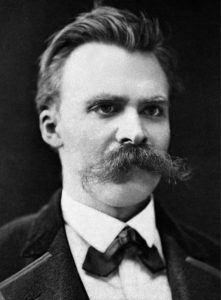Reactions to Nietzsche’s “God is dead” can be reactions to Nietzsche himself or to the words “God is dead,” or to the words in the context of Nietzsche’s overall thought. They can be reactions from experts on Nietzsche or from the general public.
God is dead by Nietzsche’s
Ever since Nietzsche’s writings have been published, these words “God is dead” have been bandied about. The experts have had their say on the matter, of course. Their discussions go into greater detail. They argue whether these are the exact words Nietzsche used, what he meant, the context in which he used them, etc.
The general public might not have the time or the interest to do a study of Nietzsche. But they hear these words. Without bothering about the accuracy of the words or doing a thorough analysis, they have their own gut reaction.
There isn’t a right or a wrong reaction. There’s only a reaction based on right or wrong information. An informed or uninformed opinion. A reaction based on a person’s beliefs or philosophy. Every person who reacts to these words of Nietzsche will have their own perspective.
 As the various reactions are described in this article, the reader must keep in mind that a similar gamut of reactions is expressed when the supposed words of Dostoevsky are uttered. His words are: “If there is no God, everything is permitted.” The same kinds of arguments are made about the accuracy, context, interpretation, etc.
As the various reactions are described in this article, the reader must keep in mind that a similar gamut of reactions is expressed when the supposed words of Dostoevsky are uttered. His words are: “If there is no God, everything is permitted.” The same kinds of arguments are made about the accuracy, context, interpretation, etc.
And there’s also a riddle from Epicurus to do with God that also inspires the same sort of arguments from all sides. This is the way the riddle goes:
“Is God willing to prevent evil, but not able? Then he is not omnipotent. Is he able, but not willing? Then he is malevolent. Is he both able and willing? Then whence cometh evil? Is he neither able nor willing? Then why call him god?”
This is just to show that various writers through the ages have uttered words that have evoked diverse reactions from people. It’s not the words themselves, but the perspective of the person who hears them that determines the response.
There may be a reaction to the words “God is dead” as they stand.
The words may have been heard first without knowing who had uttered them or what the person meant by them. Later it may be found that someone by the name of Nietzsche had said these words. But the reaction is to the words themselves.
Over the years, various opinions from others would have been heard. The reaction then put forth would be after some basic knowledge of Nietzsche was acquired. It would still not be an expert opinion. It wouldn’t take into account the exact context in which the words were uttered. Nor would they take into consideration whether they’re translated correctly.
And of course, there would be the opposition from the strong believer in God. There would be protestations with emphasis on Nietzsche’s unbalanced mind. On the other side would be the atheists arguing in support of Nietzsche’s philosophy.
The typical reaction, upon learning that Nietzsche had uttered the words “God is dead” might be, “So what?” So what if some crazy fellow takes it into his mind that God is dead? Does it matter? Should it matter? How would he know and who is he to know?
Later on, the reaction may be fleshed out a bit. Nietzsche did not “kill” God. Either there is God or there is no God. It’s doubtful if Nietzsche meant to say that there is no God, but even if he meant that he’s not the first person to have said such a thing. There have been atheists since ancient days.
The words “God is dead” imply that God has died for the person believing in God. That is to say, the belief in God has died. And this is a much more serious thing than saying there is no God. Even if someone who used to believe in God, later on, came to learn that there is no God, this is not as distressing as losing faith in God.
This might require some elaboration. Having believed in God and later learning that there is no such thing as God is like believing that the Sun goes around the Earth and later finding out that it’s the Earth that circles the Sun. The mistake here is in the perception or the lack of knowledge.
This situation is not quite so upsetting because it’s not a matter of a spiritual crisis. It’s a question of perception and knowledge. Though it may take a while to adjust to the new facts, eventually a new perspective on things is found. Perhaps a new explanation may come forth for the new state of affairs.
Losing faith in God is a severe crisis
But for a believing person to lose faith in God is a severe crisis. It’s not that the believer has discovered any new facts. It’s just that the faith doesn’t make sense anymore. The belief fails to satisfy all the yearnings and questions of the believer. So God dies in the heart.
Nietzsche may or may not have meant this with these words from the “The Parable of the Madman.”
“Whither is God? ….We have killed him – you and I. All of us are his murderers. But how did we do this?…. Who gave us the sponge to wipe away the entire horizon? What were we doing when we unchained this earth from its sun? ….Are we not straying, as through an infinite nothing? ….Is not night continually closing in on us? ….God is dead. God remains dead. And we have killed him.”
If Nietzsche went through a spiritual crisis, is it necessary that every believer who reads this should experience the same crisis? People all through the ages have gone through such experiences, except that they weren’t as vocal as Nietzsche.
Atheists may perhaps gloat at this supposed death of God. Yet people haven’t stopped believing since Nietzsche wrote these words. Yet these are powerful words. And Nietzsche is a powerful writer. And ideas are insidious. Once planted in the mind they work their magic or their destruction.
After the initial and instinctive reactions have died down the mind begins to play on these words and these ideas. There are ideas floating around all the time. If a believer is to fall under the influence of these ideas, it suggests an already existing doubt or weakness in the faith.
And for an atheist to seize upon such ideas as support for their lack of belief suggests a need for support for a shaky foundation. Ideas are seized as weapons to be used in arguments. But that’s how things go in general. And these are the kind of reactions to be encountered when Nietzsche’s words “God is dead” are uttered.






